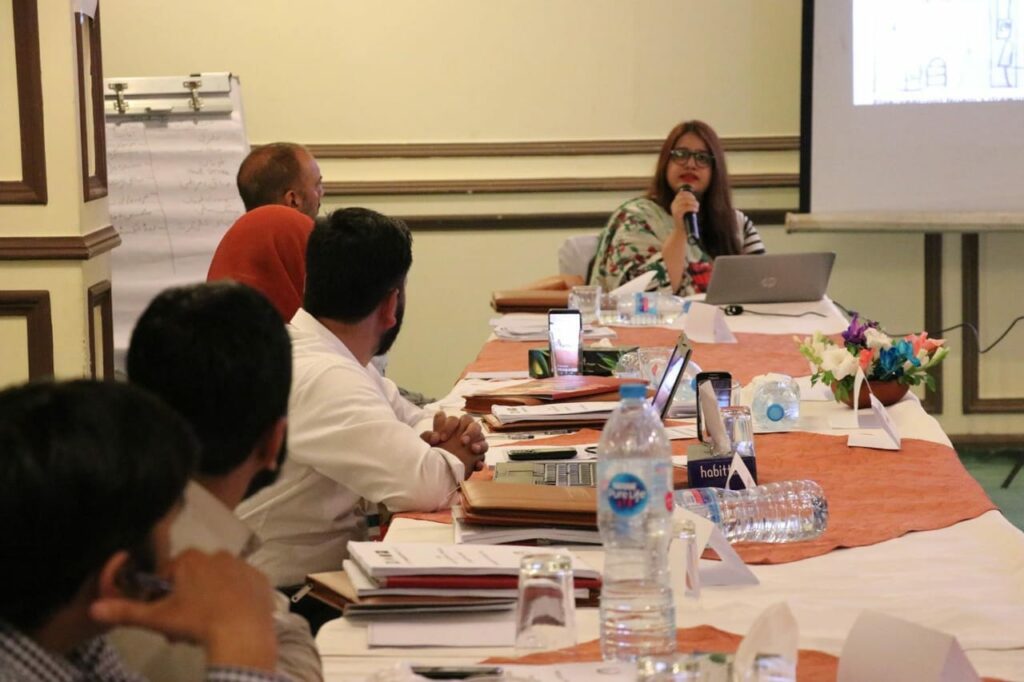Zaufishan Qureshi is a Clinical Psychologist and an Educationist based in Islamabad. She is working hard to bring about her aim to scale back psychological distress and promoting psychological welfare to solve real-world problems.
She specialized in the treatment of Trauma, PTSD, Abuse, and Anxiety Disorders. Though all these involve with our understandings, however, psychological, behavioral, and cultural factors have a profound impact on physical and mental health.

Qureshi works at SOCH Psychological Services as a Senior Clinical Psychologist. The major goal of psychotherapy medical aid is to unleash the hidden emotions and experiences of patients. She is serving as a board member of another NGO working for the rights of transgenders. She is also a Masculinities fellow of Rozan NGO and is actively involved in the rehabilitation of violent men and boys.
Qureshi’s weekly blog “#TherapistDiaries” at Express Tribune is generating awareness regarding therapy and mental health, aiming to make people mentally stronger and healthy in the society.
Following are some excerpts of a recent conversation of Zuafishan with one of our team members, Fatima Zahra in Islamabad.

What kind of patients do you to deal with mostly?
I specialized in adolescents and adult psychopathology. These issues face a range from academic to marital problems and depression to schizophrenia.
Can mental illness be inherited?
Mental illness can be inherited. It is observed that symptoms like Depression and Anxiety run in families and generations and so for Addictions and Psychosis. However, these disorders may occur without genetic dispositions as well.
Are Psychiatric disorders such as depression, drug addiction, and schizophrenia related to epigenetics?
During particular stages in pregnancy, a mother’s exposure to stressful environmental situations can cause a continual rush of cortisol, which can cause epigenetic changes in the child. The child will have a low tolerance for stress due to epigenetic alterations and are predisposed to psychiatric conditions. Epigenetic studies of the post-natal period suggest this as a critical time for developing a predisposition to psychiatric disorders if environmental conditions are not suitable.

How environmental factors are leading to epigenetic modifications and cause diseases?
Environmental factors such as violence, terrorism, migration, trauma, abuse, and long term physical illness cause epigenetic modulations that alter our capabilities to deal with stress, like inability to effectively cope with daily stresses of life. That results in maladaptive coping strategies such as addictions, sleeping and eating disorders. The situation can worsen and leads to serious mental disorders of depression and anxiety.
How childhood abuse and neglect may increase the risk of psychiatric diseases?
Childhood abuse and severe neglect fall into the category of complex trauma or CPTSD—a stress disorder. It influences brain activity and our autonomic nervous system. Cortisol is a stress hormone which flows uninhibited in case of a child in these situations, so even when the child grows up or comes out of these situations, the activity of Cortisol remains uncontrolled and as a result, the person continues to feel threats and stress when there are none. The trauma or high levels of stress put such kids at high risk of developing any form of anxiety disorder, attachment disorder, personality disorder, mood disorder on top of their primary trauma.
Furthermore, the less responsive or neglecting parents can cause epigenetic changes in the postnatal child that results in the child being fearful and anxious.
It is said that you are what your ancestors eat? Is this concept can be applied to epigenetic inheritance and psychiatric disorders?
Yes, certain psychiatric disorders and especially Autism is said to be related to the mother’s diet during the gestation period. However, this question is beyond my expertise.
From where would you get the idea of therapist diary and how is it going?
The idea of #therapistdiaries as a series of blogs on mental health was suggested by my editors at Express Tribune Blogs. I used to write blogs for Tribune before as well and they realized how my focus is always on the mental health in any social issue. Later, my editor motivated me to write more about mental health, solely every week and from than I am putting it down.

Can Memories be passed down through generations with DNA?
There is a concept of Collective Unconscious in Psychology. According to C. G. Jung, all humans have some common memories that they have been inheriting from their ancestors since the time of evolution.
There is also a concept of generational trauma in psychology, which suggests that you may be affected by the traumatic incidents your ancestors have experienced even though you may be born a century later.
According to epigenetic studies, our genes remember the traumas that we go through and impacts the next generations. For instance, the generations of people who survived holocaust are prone to anxiety disorders, according to various epigenetic studies.
More often people with depression are not comfortable with how they feel. Is there any difference in the rate of patients as compared to the past?
The rate of patients has increased over the years. The stigma still remains in its full strength but some awareness is achieved. Also, the new generation is an active agent in speeding up the process of mental health. Currently, we are not in a position to say that the stigma has significantly improved or that the underprivileged have full access to mental health facilities.
Is there a need for counseling of the rest of the family members other than patient?
More than often, the family members are involved in the therapy of the patient. For better mental health, we have to improve the environment of the patient and to ensure social support in addition to the patient’s personal therapy. If we do tremendous work with the patient in therapy but at the end of the day they have to go to the same house where they are being stigmatized, abused or not supported, then what is the use of therapy? So, we try our best to involve the family and psycho-educate them.
How long will it take a patient to regain its’ self-confidence?
Mental health does not share a cause and effects the relationship with self-confidence. I have seen a lot of patients with mental health issues but an incredible self-confidence at the same time. However, for those who experience self-confidence issues, it takes around two months to develop self-confidence.
Let us know about your future goals?
I planned to research and specialize further in my selected area of treatment. Also, I want to publish a book related to the aspect of psychotherapy that might be helpful for the people. Furthermore, I’m a Masculinities fellow of Rozan, so would like to do something related to the rehabilitation of violent men.
Note: Zaufishan Qureshi can be reached at zaofishan.qureshi@gmail.com

Fatima Zahra is a student of Quaid-e-Azam University Islamabad doing her BS Biochemistry. she is interested in reading suspense stories, creative writing, and also fond of cooking.

